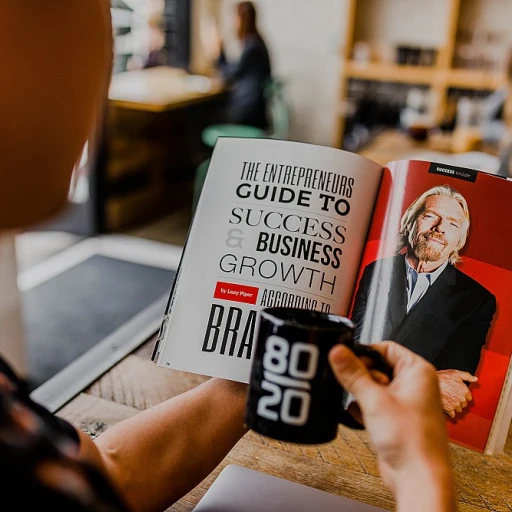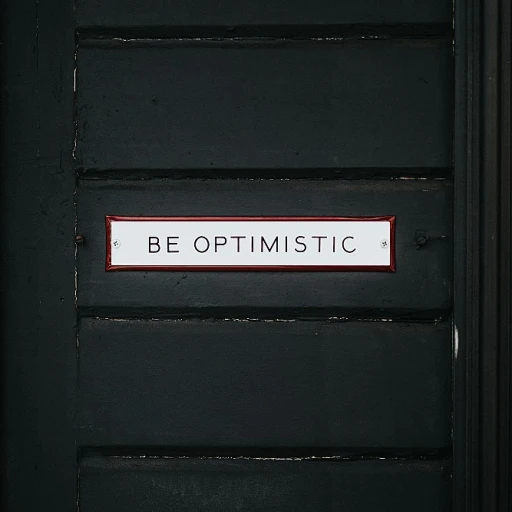Defining the New Corporate Frontier: Social Movements and Business Strategy
The Corporate Shift Towards Social Consciousness
Today's businesses aren't operating in a vacuum. They are active participants in a larger societal conversation, where social movements often dictate the pace and direction of change. Witnessing a transformational era, companies are recognizing the crucial role that movements for social justice, environmental sustainability, and other causes play in shaping market dynamics. We're seeing strategic pathways to economic elevation align with the values and actions propagated by these powerful collectives.
Aligning With the Zeitgeist: Strategic Imperatives
The modern consumer isn't just buying products or services; they're looking to support brands that represent their values and hopes. A study by Cone Communications shows that 87% of consumers will purchase a product because a company advocated for an issue they cared about. With collective movements such as Black Lives Matter and environmental sustainability initiatives gaining ground, it's no surprise that cultural fluency in these areas is becoming a strategic imperative for businesses.
Authentic Engagement: Beyond Symbolic Support
More than ever, superficial endorsements or passive acknowledgments won't cut it in the eyes of the public. The expectations are shifting towards genuine engagement and meaningful partnerships. Companies such as Ben & Jerry's have set a precedent with their history of outspoken activism and support for various causes, showing that authentic involvement in social movements can resonate powerfully with both the public and employees alike.
The Societal Stage: How Social Movements Shape Consumer Expectations
Understanding Consumer Consciousness
In the flourishing landscape of social conscience, companies can no longer afford to be mere spectators. Indeed, consumer expectations are being profoundly shaped by social movements. A report by Cone Communications found that a staggering 87% of consumers will purchase a product because a company advocated for an issue they cared about. In this sphere of influence, movements such as Black Lives Matter and environmental sustainability are not just headline news; they are powerful harbingers of consumer trends.
The Ripple Effect in Market Dynamics
Movements ignite discourse, and this discourse integrates into the fabric of market dynamics. Consumers are wearing their values on their sleeves, opting for brands that align with their ethos. For instance, the rise of the Civil Rights Movement mirrored an evolution in advertising narratives focusing on diversity and inclusion, influencing a broad spectrum of industries from beauty to technology.
Driving Forces Behind Ethical Consumerism
It's not just about making a stand; it's about embracing a culture of ethical consumption. The concept of 'voting with your wallet' is gaining momentum, with consumers increasingly investigating the corporate social responsibility (CSR) efforts of companies. Studies from university press journals underscore that this isn't a passing trend. It's a paradigm shift where a company's stance on societal issues can make or break its market position.
A Synergy of Movements and Marketing
Marketing strategies are evolving in response to the voice of the people. Social media campaigns now frequently feature messages of empowerment and collective action. Indeed, a survey by Sprout Social revealed that 70% of consumers feel more connected to brands with CEOs that are active on social media about social issues. Whether it's responding to political events or supporting global movements, a brand's engagement can amplify its reach and resonance.
Celebrating Voices of Change
In this ever-changing panorama of public dialog, stories of individual and collective triumph resonate deeply. Narratives surrounding figures like Rosa Parks and events such as Occupy Wall Street serve as emblems within the consumer landscape, guiding not only public sentiment but also purchasing patterns. It's clear that in today's market, authenticity and advocacy are not just valued—they are vital.
Infusing Data Insight into Decision Making
Turning to the numbers, analytics play a pivotal role in understanding this new wave of consumer behavior. By delving into data, companies can ascertain the pulse of consumer sentiment relating to social movements. By leveraging tools like Google Scholar and Crossref Google, businesses can glean actionable insights that enable them to align more closely with the collective consciousness of their customer base.
Charting the Course Through Consumer Expectations
As society's stage continually shifts, so too must the strategies of savvy businesses. The companies that will thrive are those that recognize and respond to the transformative power of social movements. For those looking to deepen their understanding of the strategic intersection between social trends and market success, the article, Navigating the Maze of National Competitiveness: Strategic Pathways to Economic Elevation, offers valuable insight into leveraging these dynamics for competitive advantage.
Building Bridges, Not Walls: Companies Collaborating with Movements for Change
Strengthening Community Ties through Collaborative Initiatives
In an era where people and politics converge, businesses are increasingly aligning themselves with social causes that resonate with their customers, employees, and the wider community. It's a dance between maintaining brand integrity and supporting substantial, sometimes controversial, societal shifts. Collaborating with social movements isn't a superficial trend; rather, it's a deliberate strategy to foster trust and establish a lasting connection with the public.
Case Studies in Corporate Activism
The business landscape is dotted with instances where companies have turned social issues into business strategies. Take, for instance, the way Patagonia has been unwavering in its commitment to environmental activism, influencing its customers to follow suit. Not to mention how Nike's endorsement of Colin Kaepernick amplified conversations on racial injustice, creating a surge of public support — and dissent.
Experts in the field, like Sidney Tarrow, point to these partnerships as ripe with potential for companies to do well by doing good. Studies have shown that consumers respond to companies that take a stand. A report from Cone Communications revealed that nearly 90% of consumers would purchase a product from a company advocating for an issue they care about.
The Mechanics of Alliance
Allying with a social movement requires a deep understanding of its goals, challenges, and the people involved. It's about elevating the movement while enhancing the company's values.
For example, when businesses backed the civil rights movement, they tapped into the collective power of a society asserting for equity and justice. They supported not just the ideas behind the movement but also recognized the civil rights movement as a crucial part of American history.
When companies synergize with social movements, they meticulously weave social consciousness into their fundamental decision-making processes. It's more than a shared hashtag or a one-off donation; it's about sustained actions that mirror the persistent efforts of the movements they align with.
Pioneering Progress through Shared Values
As societal expectations shift, corporations forge ahead not by building walls around their interests but by laying the bricks for bridges of change. This progressive approach isn't just about optics; it's grounded in shared values and goals that resonate across various stakeholders.
The power of these collaborations also emerges from the depth of the resources — financial, human, and social — that companies can offer. By employing resource mobilization theory, corporations can extend the reach and amplify the voice of movements, steering conversations towards constructive change.
Lessons from Boots on the Ground
Learning from the trenches, organizations find their greatest lessons in the resilience and strategies of grass-roots activists. Whether it's the vigor of Black Lives Matter or the persistence of the Women's Suffrage Movement, the core values of determination, equality, and respect ring true for businesses aiming for social integration.
These partnerships often reveal the importance of having a clear understanding of a movement's stages and the various political opportunities that arise. It's in these nuances that businesses can discern when and how to support effectively — from promoting public health initiatives to advocating for pressing issues like environmental preservation.
Synergizing Movements with Mission: Integrating Values for Competitive Advantage
Values in Harmony: Conjoining Company Ethos with Social Advocacy
In a world abuzz with advocacy, the savvy business recognizes that aligning with social movements isn't simply about good PR; it's a strategic maneuver that can define their core operations and set them apart from competitors. Take Patagonia as an example, a company that has seamlessly integrated environmental activism into its brand identity. Their dedication to sustainability and conservation efforts has not just attracted customers but also fostered a passionate community in support of their mission.
The Numbers Speak Volumes: Aligning Mission and Movement
It's no secret that modern consumers vote with their wallets. A Nielsen report underscores how 73% of global consumers say they would definitely or maybe change their consumption habits to reduce their environmental impact. Google Scholar and crossref studies support that brands championing social causes can enjoy stronger consumer loyalty, while those perceived as socially indifferent risk eroding their customer base.
Walking the Talk: Case Studies of Social Integration
Revolutionary social movements like the civil rights movement and Black Lives Matter have reshaped public consciousness. Organizations that have affirmed their support for racial equality and taken concrete steps to promote diversity and inclusion have seen a positive impact. For instance, Netflix's commitment to amplifying black creators and stories resonates deeply with diverse audiences, leading to increased viewership and support for social change.
Leveraging Expert Insights
Authors like Sidney Tarrow, a renowned political scientist, have dissected the powerful dynamics of movements and social changes in works published by university presses. These expert analyses offer invaluable insights for companies aiming to understand and thoughtfully engage with activist movements. Tactics such as resource mobilization theory, as detailed in various sociology of social movements textbooks, can illuminate best practices in integrating an organization's operational strategy with social engagement.
The Ripple Effect: Beyond Token Gestures
When a business integrates its values authentically with social movements, it creates a ripple that extends far beyond its own sphere. For example, when companies began extending support to LGBTQ+ rights, it didn't just reflect in rainbow logos during Pride Month but also in inclusive workplace policies and public stances that influenced other spheres like politics and public health.
Measuring the Impact: How Social Movements Drive Policy and Profit
Quantifying the Influence of Social Endeavors on Organizational Growth
Delving into the numbers, it's clear that the interplay between social movements and business outcomes is more than just a feel-good narrative. One might see this in the aftermath of pivotal civil rights milestones, like the Supreme Court's historic decision supporting marriage equality in the U.S., which swiftly influenced a surge of inclusive marketing and corporate policies. Companies both large and small recognized the significant public sentiment and adapted swiftly. That’s more than just a change in principle—it’s also smart business sense. Indeed, according to McKinsey, diverse companies outperform their non-diverse counterparts financially by 35%.
Case Studies that Illuminate the Power of Social Momentum
Case studies abound when it comes to social movements shaping business. The Black Lives Matter movement has prompted scores of businesses to evaluate their hiring practices and community engagement strategies, leading to improved diversity and increased consumer trust. Studies from Harvard Business School suggest that taking a stand on social issues does not alienate customers as once feared—so long as the stance is authentic and aligned with corporate values. For instance, footwear giant Nike experienced a 31% increase in sales following its stirring campaign featuring Colin Kaepernick. And let's not forget the social influence on environmental policy—companies adopting green technologies are not only meeting the popular demand for sustainability but are also seeing a decrease in operational costs over time.
Revolution in Corporate Policies and Consumer Expectations
The groundswell of collective action doesn't just influence marketing; it revolutionizes entire corporate policies and consumer expectations. Take the public health realm, where grassroots movements have transformed fast-food menus and soda sizes. These aren't mere shifts on a whim but reflect national concerns about health, leading to better choices and a more aware public. Moreover, university research dives deeper, showing that for every 10% increase in consumer awareness, there is a 5% to 7% shift towards socially responsible corporate behavior. With social media being the modern public square, it's become an essential platform for gauging and shaping these movements.
Sociopolitical Shifts and Corporate Adaptability
When it comes to politics, businesses can't afford to take the backseat anymore. A research report from Oxford University Press mentions how companies are increasingly being seen as 'agents of change' due to their influence and reach. The implication is clear: It's no longer enough to silently accrue profits; organizations must act as stewards of societal change. Whether it's supporting legislation, launching advocacy campaigns, or fostering dialogue on sensitive issues, companies are realizing the power of their voice and the expectation of their stakeholders for them to use it.
Navigating Risks and Rewards: The Strategic Balance in Social Engagement
Assessing the Landscape: Social Movements in Business Strategy
Social movements, from civil rights to environmental activism, have historically been powerful agents of change. Dissecting their implications for business is more than a casual look-see; it's about reading the vibes of society and aligning with the currents of change. In this strategic balancing act, companies are learning that their interactions with social movements can yield both fruitful collaborations and complex challenges.
Calculating Moves and Motives
When companies engage with political and social causes, they tap into the collective heartbeat of their potential customers. A survey in 2018 by Cone/Porter Novelli pointed out that 66% of consumers reckon businesses should take a stand on issues, a clear sign that indifference might be more costly than involvement. However, it's not only about showing up; it's understanding the moves and motives. We know that companies thrust into social conversations without a clear strategy can be like a novice chess player in a grandmaster's game.
The Power Dynamic: Embracing Collective Causes
Movements like Black Lives Matter have shown the sway that collective identity can hold. Companies aligning with such causes do so knowing that they're picking a side in an increasingly bifurcated court of public opinion. For example, Nike's support of Colin Kaepernick, as reported by Edison Trends, saw a 31% increase in sales, demonstrating that standing with a movement can resonate with powerful economic effects — when the shoe fits, both literally and ideologically.
Mobilizing Resources with Foresight
Engagement is not all or nothing; it's making smart choices. Resource Mobilization Theory, a principle familiar to students at the University of Chicago Press, posits that movements succeed based on the resources — money, allies, media — they can mobilize. Companies might not march on Washington, but they need a playbook that's ready for the big leagues if they choose to step into the arena.
Capitalize on Political Opportunities or Stand Clear
Timing, as they say, is everything. Political Opportunity Theory holds that the success of social engagement is often about striking when the iron's hot. For businesses, this could mean aligning with movements when public sentiment is at a fever pitch. But make no mistake, controversy lurks around every corner. A misstep on a hot-button issue and a company might find itself in a public relations tailspin.
Strategic Integration: The Thoughtful Approach
It's a mind game and a heart game. Sidney Tarrow, renown in the quaint halls of scholarly research, reminds us of the 'cycle of contention' — a complex interplay of timing, agency, and opportunity that shapes social movements. Companies eyeing social engagement seek the sweet spot where their mission, values, and strategic goals intersect with the social zeitgeist.
The Bottom Line: Profit and Principle
Finally, let's talk turkey. The push and pull of principle and profit are ever-present. Business leaders are keenly aware that while social movements can herald change, the compass that navigates them towards success must balance ethical engagement with bottom-line benefits. After all, a business that rides the waves of societal change must keep its boat sturdy for the journey ahead.
The Power of Collective Action: Employee Involvement in Social Movements
The Synergy of Employee Advocacy and Social Engagement
The role of the employee collective in fostering organizational change can’t be overstated. It’s not just about the weight of the organization’s name supporting a cause; it's the passion and action of individuals that truly ignite progress. A study from the Institute for Public Relations found that over 50% of employees believe it’s important to work for a company that shares their social and environmental values. This highlights a prevalent trend where employee involvement in social movements isn’t just supported, it’s expected.
Transformative Alliances Between Staff and Social Causes
When it comes to change, it’s all about unity. Companies are increasingly recognizing the value of aligning with their employees’ social perspectives, creating platforms for staff to support movements for racial justice such as Black Lives Matter or climate change initiatives. American corporations took note when employee walkouts at major tech firms signaled the need for environmental accountability, reflecting a growing pattern of employee-led initiatives.
Resource Mobilization from Within
Integrating sociological insights into business praxis, the concept of resource mobilization is getting a novel twist. Employees bring not just their labor to the table, but also their networks, skills, and influence to support causes. The collective power of employees can therefore turn a business into a force for political opportunities and social transformation, pairing profitability with sustained social impact.
Cultivating a Culture of Collective Identity
The value of collective identity in a corporate sphere can be gleaned from how social movements thrive by fostering a shared sense of belonging. Companies that harness this through encouraging employee engagement in movements can fortify their organizational culture and boost morale. The sociological framework that underpins the successful strategy of movements like Black Lives Matter can be an insightful guide for corporations looking to understand the intricate dynamics of collective action.
Insights from the Frontlines of Social Action
Case studies also reveal the compelling influence of social change on corporate strategies. For instance, Rachel Carson’s "Silent Spring" heralded an environmental movement that transformed corporate America’s approach to public health and the environment. Likewise, participation in Pride events by employees is now a common feature for many companies, showing solidarity with the LGBTQ+ community and influencing branding and political stances.
Walking the Talk: Making Employee Advocacy Actionable
It’s not enough to talk the talk; employees today want to walk it. That’s why businesses are integrating volunteer programs, matching grants, and platforms for community initiatives into their operational models. Yet, balancing the diversity of employee perspectives with corporate goals can pose a complex challenge. Sociologists like Sidney Tarrow suggest mechanisms for this balance, detailing how movements overcome dissension to achieve unified objectives. Organizations can learn from these movements to create coherent strategies that align with both employee values and business goals.
A Better Tomorrow: Envisioning the Future of Business in a Socially Active World
Championing Sustainability: The Role of Business Amidst Evolving Social Issues
As businesses and social movements dance their intricate tango, eyes are fixated on the horizon where the future of business in a socially active world is being sketched. It's a world teeming with possibilities, where every individual and organization has the potential to be a protagonist in the tale of change. Companies that once stood as behemoths of industries are now humbly learning from grassroots campaigns and the vigour of public advocacy.
Integrating Social Movements for Long-Lasting Progress
Progress isn't just a shiny trophy to display. It's a constant movement through uncharted waters requiring businesses to foster genuine, reciprocal relationships with movements for social change. The rise of collective action has not only amplified voices but has also beckoned for boardroom doors to open, welcoming activists and community leaders to the strategy table. It is here where enterprises can grasp the nuances of social narratives and infuse them into the marrow of their corporate mission.
Corporate Canvas: Painting Futures with the Brush of Inclusion
Imagine the corporate canvas, once grey with strictly business undertones, now splashed with the hues of inclusivity and human rights. The evolving tableau showcases an acknowledgment that championing causes like Black Lives Matter or advocating for sustainable environments isn't a mere public relations maneuver—it is the essence of a business's existence and the measure of its legacy.
Pioneering Tactics: The Emergence of Socially-Minded Business Models
Moreover, a seismic shift in consumer sentiment today is swaying the balance towards businesses that not only offer value but values. Studies unequivocally show a growing consumer base inclined to support companies that exemplify social responsibility. The innovative disruptors are those who treat societal challenges as an avenue to pioneer–incorporating environmentally friendly practices or promoting fair trade, intertwining their revenue model with societal well-being boosts their brand image and their bottom line.
Leveraging Technology for Advocacy and Alliance
We live in an era where social media platforms serve as catalysts for societal transformation, enabling individuals to mobilize and spread messages virally. Through leveraging digital tools and analytics, forward-thinking companies are aligning with social movements, crafting campaigns that resonate with the collective conscience. As these alignments become more prominent, the data sets reiterate a company's need to keep pace with public opinion and the prevailing winds of social justice.
Forecasting the Future: Strategically Steering Through Social Currents
To truly voyage into a better tomorrow, businesses must learn to strategically steer through the dynamic currents of social movements. The success stories of tomorrow will belong to those companies that have proactively adapted and aligned with the societal shifts today. As businesses embrace social movements not as risks but as partners in their journey, they construct a robust foundation for a thriving enterprise that resonates with the heartbeat of the times.
As the narrative of business and its intersection with social movements unfolds, it's quite clear that the futures we envision are collectively scribed by the actions, strategies, and choices of today. It's a narrative of hope, of possibility, and of a shared destiny where profit harmoniously coexists with people and planet.














